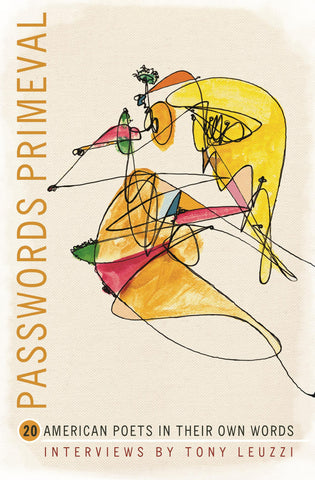
About This Title
Signed copies available in limited supply
“Robert Frost didn’t like to explain his poems—and for good reason: to explain what a poem says is to suck the air from its lungs. This does not mean, however, that poets shouldn’t talk about their poetry, or that one shouldn’t ask questions about it. Rather, it suggests that any discussion of poetry should celebrate its ultimate ineffability, and in so doing, lead one to further inquiry. It is my hope that the discussions in Passwords Primeval illuminate these poets and their poems in such a way that one may access valuable insights into their work without the work losing any of its magic or mystery. In sequencing the discussions for this book, I realized certain relationships between a number of the writers that were previously obscured by my knowledge of movements and schools. Contemporary American Poetry is a vast, evolving entity that does not cohere in some neat, manageable form. Passwords Primeval does not pretend to fully represent the diversity of poetry written by Americans in the last 40 years. Nonetheless, a front-to-back reading of the book will demonstrate an astonishing interconnectedness, as if each voice echoes another from opposite ends of the same canyon.”—Tony Leuzzi, from the Introduction
Excerpts from the interviews:
“There are two things that move me, besides the technical issues, in poetry: one is an extreme anger, a’la the Jewish Prophets, about injustice and stupidity–maybe more stupidity than injustice, although the two are deeply tied together; and the other is forgiveness, or ‘loving kindness,’ if you will. It’s a part of realizing that life is limited, how short it is, and you can’t make the radical changes you wanted to make when you were 18 years old. You have to forgive a little bit–but not too much!”—Gerald Stern
“Writing is our second throat. The only difference between someone who doesn’t write and me is something in my life caused that throat to click open. Once you’ve discovered that second throat there’s no way not to use it. It’s what keeps me from shooting up post offices.”—Patricia Smith
“Allen Tate and Harold Bloom told us what political poetry can and cannot do, what it is and what it isn’t. We rarely challenge their assumptions or look at the tradition of poetry in historical terms. If we did we would realize there are all these buried treasures. And if we unearthed them we might begin to see some exciting alternatives.”—Martin Espada
“...the story of an idea is as dramatic as the story of something we typically call anecdotal, like coming across a dead body in the park and trying to play detective to figure out how that happened. You can also come across dead love and do a little detective work to see how this happened. Ideas and how they develop are so oddly obvious, but only after they seem to have been found.”—Dara Wier
Praise for Passwords Primeval
“Poet and professor, Leuzzi brings questing intelligence and a practitioner’s empathy to this collection of interviews with 20 poets who are diverse in terms of aesthetic allegiance, generation, and practice... The range of topics proves that poetry isn’t just for poets. This book will be a joy for anyone who loves the art of conversation, not just the conversation of art.” —Publishers Weekly Starred Review
Publication Date: October 16, 2012
ISBN: 978-1-934414-95-8
© BOA Editions, Ltd. 2012

